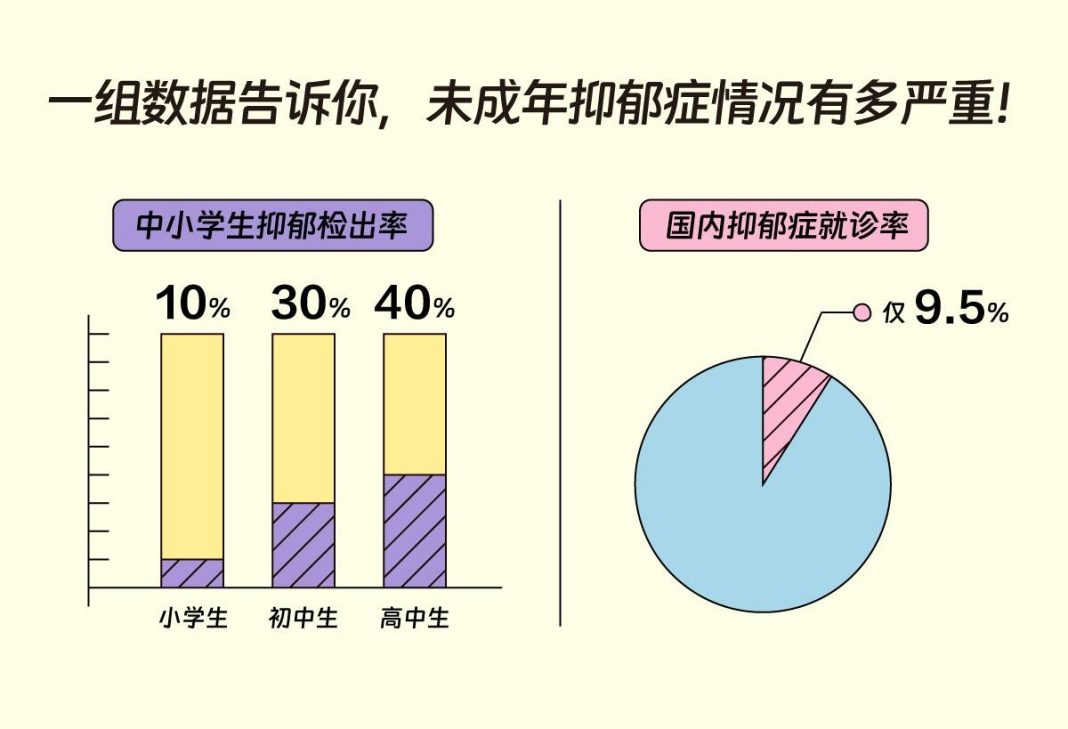Now, not only adults face great pressure, but minors also face significant stress. Due to the overwhelming pressure, an increasing number of minors are choosing to “lie flat” just like adults.
Currently, there are 30 million minors in our country, but at least 30 million children and adolescents under 17 face emotional or behavioral issues.
Among these, depression is the primary mental health concern. Currently, 10% of elementary school students, 30% of middle school students, and 40% of high school students in our country have been diagnosed with depression.
When children experience mental health issues, they show signs such as decreased learning efficiency, poor interpersonal relationships, excessive anxiety and rebellion, addiction to mobile phones and the internet, and spending time daily watching short videos or playing games.
In fact, behind the increasingly serious mental health issues among minors, there are often multiple factors at play such as family environment, academic pressure, social factors, and competition pressure. Among these, the family environment is the primary factor leading minors into depression.
For children, mental health issues often arise during adolescence. Adolescence is the period of most rapid and noticeable physical and psychological changes. These rapid changes, both physically and mentally, make children more susceptible to mental health issues.
Some parents are overly indulgent, causing children to struggle with adapting to society. On the other hand, some parents are overly strict, resorting to punishment and scolding for every mistake.
In normal families, parents often focus only on their children’s physical growth, intellectual development, and material needs but neglect their emotional well-being.
The pressure of academics cannot be ignored. Parents hope for their children to excel academically, exerting various pressures on them. During weekends and holidays, children are not allowed to play freely but are forced to attend extra classes. With no time for play, children are more prone to developing mental health issues over time.
Under immense pressure, many minors start experiencing mental health issues and opt to “lie flat,” seeking escape in the virtual world, immersing themselves in short videos and games all day long.
If a child shows signs of mental health issues, the first step for parents should be to seek professional treatment at a hospital. Only through this can the child receive timely care and prevent the escalation of mental health issues.
Of course, merely taking the child to the hospital is not enough when they have mental health issues. Such issues in minors often signify underlying family issues.
Hence, parents should strive to create a healthy, warm, and harmonious family environment, change negative parenting methods, avoid physical or verbal abuse, sarcasm, and mockery, communicate more, offer guidance and encouragement, pay attention to the child’s feelings and emotions, and try to see things from their perspective.
Furthermore, parents should encourage children to explore other interests such as reading, painting, etc. Parents who have the means can enroll their children in summer camps, art classes, and other activities to help them find joy in advanced pursuits.
When parents help children discover higher-level joys, children naturally steer clear of excessive indulgence in short videos and games. Once children experience these higher levels of joy, they won’t find the same allure in video-watching and gaming anymore.
Addressing mental health issues in minors also requires efforts from schools, communities, and various sectors of society. Only when families, schools, medical institutions, and society work together can we build a protective barrier for minors and safeguard our children.


